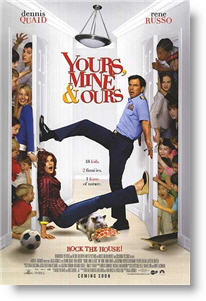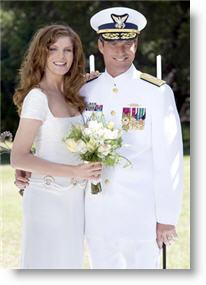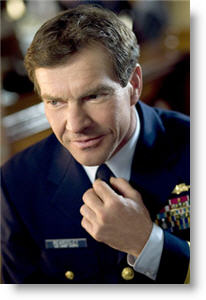From Classic Movie to Contemporary Remake—Interviews with co-writers Ron Burch and David Kidd, actor Dennis Quaid, and Director Raja Gosnell of “Yours, Mine and Ours” (2005)
by Chris Monroe
Staff Writer

While the 2005 film “Yours, Mine and Ours” has the same premise as the original 1968 film (with the same title) the filmmakers are reluctant to call it an actual “remake” since it was not made shot for shot from the original film. Instead, co-writers David Kidd and Ron Burch adapted a new script based on the original screenplay, with their mandate being to update the film and make it feel contemporary.
David Kidd
One of the ways Kidd and Burch made this film relevant to our day—and also politically safer—was to avoid making Dennis Quaid’s character (Admiral Frank) active military. This was due to the Middle East situation, as Kidd explains:

In the original film, and in real life, he [Frank] was in the navy. Because of the situation in the Middle East, nobody wanted to go there, but we wanted to keep that feel for his character, and the sense of discipline and order, and the way his life had been run up until then. So we put him in the Coast Guard—even though we know, of course, there are Coast Guard members serving over there, but just normally, people would think of the Coast Guard being here [United States].
The reason Kidd says “real life” is because this film is based on a true story, and while the actual family was brought in to consult during the making of the original 1968 film, Kidd says that the film itself was the only thing they were given to work from.
While talk about the original film came up a lot during our discussion, Kidd and Burch seemed more than willing to converse about it. They seem to see their film as something different and not something to be used as a comparison. For example, Kidd explains that Rene Russo should not be compared to Lucille Ball, who played the same character in the original 1968 film. Kidd also mentioned the recent re-release of the original 1968 film:
The original film, over the past year, actually, was just released on DVD—and it’s doing incredibly well. And I think people seeing this film will probably go back and rent the original film… and enjoy it, because it is a different film—as opposed to a film that is trying to supersede a previous film. We were kind of relieved that we didn’t have to, frame for frame, remake the original film, because there’s no way you could compare; there’s no way you could compete.
Apparently, in the original “Yours, Mine and Ours,” there is a direct emphasis on spirituality and religion. The family is devoutly Catholic, and one of the main issues in the plot has a moral tale about true love contrasted with the idea of just spending one night with someone. Addressing that particular point, Kidd said:
…We didn’t copy that exact same storyline because we were trying to deal more with the conflicts between the families as opposed to specific problems within the separate families, which is the reason that we didn’t include the storyline…
Kidd continues to explain how he sees aspects of spirituality in this new version:
I’d like to think that there is spirituality in it without an overt reference to religion. We did want them to get married. We did want a spirit of love and acceptance to pervade the film, because ultimately, the larger issue in the original film is about acceptance… We didn’t want to exclude any particular religion, so we didn’t choose one.
Another issue I noticed in the film, which seemed to resonate with contemporary ideas and principles was the issue of spanking. Several times throughout the film, talk of whether or not to spank the children arose between Frank and Helen as they attempt rear eighteen children together. Kidd’s thoughts on this:
We thought it’s the natural dilemma. I don’t think anybody spanks their kids the way they used to “back in the good ol” days.” There are people who do spank their kids—even if it’s just, as Frank says, “Just a pat on the butt to send the right message.” There are people who don’t spank their kids, but wish they could. They just don’t feel as if it’s right. We thought there was a lot of comedy to be gotten from two people who view this differently.
In the film, Helen is the free-spirited one who would never think of spanking her kids, while Frank is more of a firm disciplinarian—although neither of them ever spank one of the kids in this film.

Dennis Quaid
This idea of spanking your children also came up when I spoke with Dennis Quaid, and how he views this practice. He said:
I’m not really a believer in spanking kids, to tell you the truth. (laughing) I think it teaches them to hit people, basically, as a way of solving things… I think I got a couple of half-hearted spankings… my dad was not really a disciplinarian. But… never had to do it with my son. I think the only thing I ever did was I swatted his hand when he touched the stove one time—mostly because it just scared me. But never did it again. It killed me.
Quaid also balances that statement by saying that while he’s not much of a disciplinarian (like his character, Frank), he’s also not like Russo’s character in the movie, Helen, who holds to the motto of “free to be you and me.” Quaid says he’s sort of in between.
Raja Gosnell
Director Raja Gosnell enjoyed the different challenges of making this film. He liked the mixture of the family comedy, combined with the adult love story. And while he doesn’t seem too concerned, Gosnell explained that he is ready for any criticism he might receive:
Critics are going to do their job. If in their mind their job is to point out everything we did wrong, then that’s what they’ll do. The critics have never really liked my movies, and I don’t expect that they’ll suddenly embrace this one—although they might, because I think Dennis and Renee are terrific, and I think there’s elements that they would embrace.Movies that please mass audiences rarely seem to please critics. There’s obviously some great ones — “Toy Story”, “The Incredibles”…“Shrek”—but it’s hard. It’s hard.
Raja also explained, aside from the critics, what makes him happiest as a moviemaker:
My favorite thing is to sit in a theater and watch families, from little kids, to mom and dad, to grandma laughing and having a good time and enjoying a family night out. If I can provide that, then that’s rewarding to me.
See our REVIEW of “Yours, Mine and Ours”